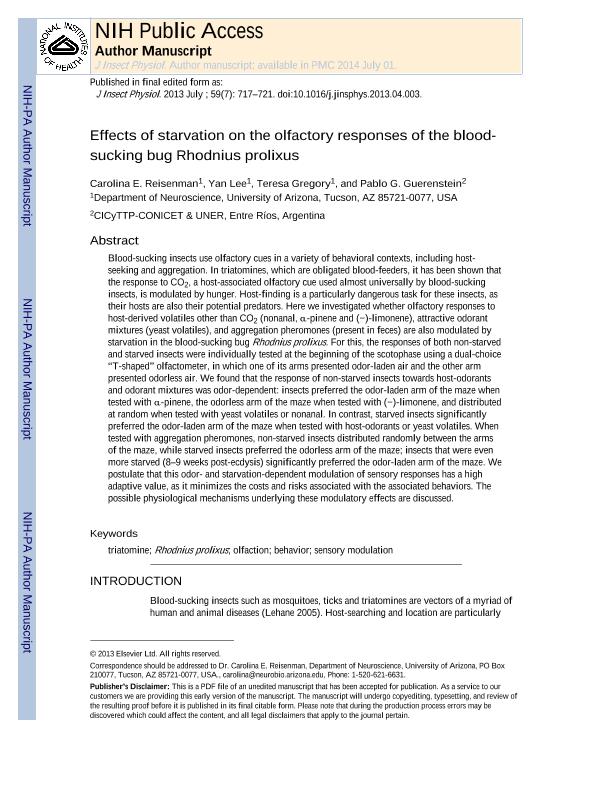Artículo
Effects of starvation on the olfactory responses of the blood-sucking bug Rhodnius prolixus
Fecha de publicación:
07/2013
Editorial:
Elsevier
Revista:
Journal of Insect Physiology
ISSN:
0022-1910
Idioma:
Inglés
Tipo de recurso:
Artículo publicado
Clasificación temática:
Resumen
Blood-sucking insects use olfactory cues in a variety of behavioral contexts, including host-seeking and aggregation. In triatomines, which are obligated blood-feeders, it has been shown that the response to CO2, a host-associated olfactory cue used almost universally by blood-sucking insects, is modulated by hunger. Host-finding is a particularly dangerous task for these insects, as their hosts are also their potential predators. Here we investigated whether olfactory responses to host-derived volatiles other than CO2 (nonanal, α-pinene and (−)-limonene), attractive odorant mixtures (yeast volatiles), and aggregation pheromones (present in feces) are also modulated by starvation in the blood-sucking bug Rhodnius prolixus. For this, the responses of both non-starved and starved insects were individually tested at the beginning of the scotophase using a dual-choice “T-shaped” olfactometer, in which one of its arms presented odor-laden air and the other arm presented odorless air. We found that the response of non-starved insects toward host-odorants and odorant mixtures was odor-dependent: insects preferred the odor-laden arm of the maze when tested with α-pinene, the odorless arm of the maze when tested with (−)-limonene, and distributed at random when tested with yeast volatiles or nonanal. In contrast, starved insects significantly preferred the odor-laden arm of the maze when tested with host-odorants or yeast volatiles. When tested with aggregation be, while starved insects preferred the odorless arm of the maze; insects that were even more starved (8–9 weeks post-ecdysis) significantly preferred the odor-laden arm of the maze. We postulate that this odor- and starvation-dependent modulation of sensory responses has a high adaptive value, as it minimizes the costs and risks associated with the associated behaviors. The possible physiological mechanisms underlying these modulatory effects are discussed.
Palabras clave:
Triatomine
,
Rhodnius Prolixus
,
Olfaction
,
Behavior
,
Sensory Modulation
Archivos asociados
Licencia
Identificadores
Colecciones
Articulos(CICYTTP)
Articulos de CENTRO DE INV.CIENT.Y TRANSFERENCIA TEC A LA PROD
Articulos de CENTRO DE INV.CIENT.Y TRANSFERENCIA TEC A LA PROD
Citación
Reisenman, Carolina Esther; Lee, Yan; Gregory, Teresa; Guerenstein, Pablo Gustavo; Effects of starvation on the olfactory responses of the blood-sucking bug Rhodnius prolixus; Elsevier; Journal of Insect Physiology; 59; 7; 7-2013; 717-721
Compartir
Altmétricas




